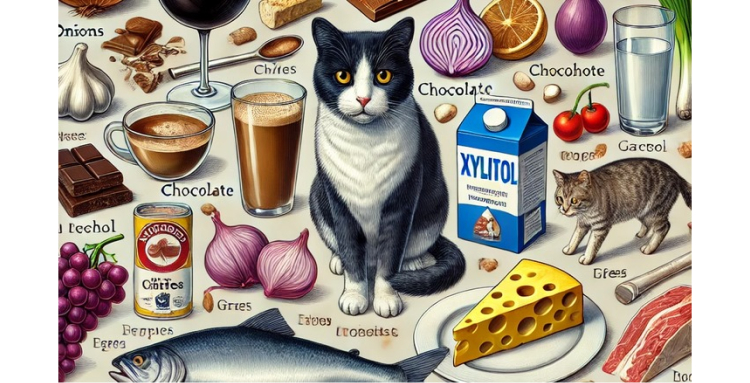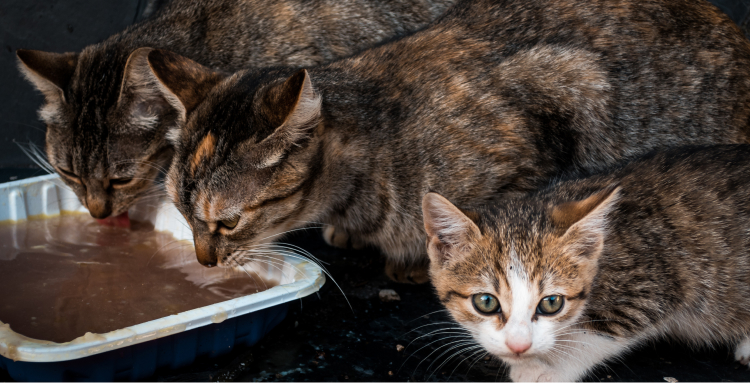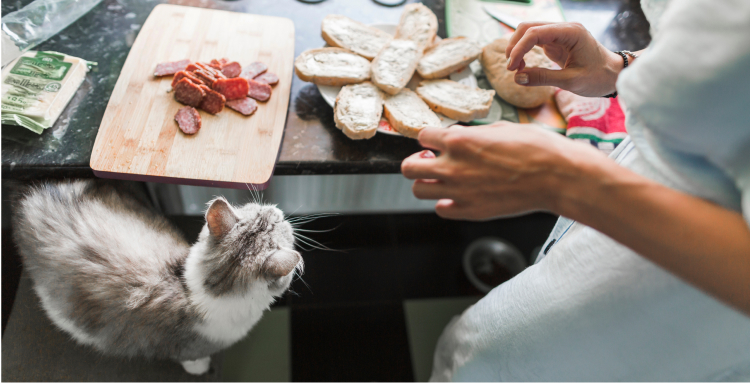Cats are like babies. They will chew, nibble, or put just about anything in their mouths if it catches their attention. Sometimes, out of curiosity, intrigue, or because something smells good can trigger a cat’s urge to eat or chew. For example, marshmallows are really intriguing to our felines. They just cannot resist the appearance, texture, or smell of marshmallows. Though marshmallows are not toxic food for cats, they aren’t healthy either. The same goes for other substances or foods.
However, in some cases, certain foods can become toxic for them, even poisonous. What will you do if your curious cat ingests toxic foods or something poisonous?? There are certain steps you can take. But first, you need to know which foods or things can be dangerous for them.
What foods are usually toxic to a cat

When it comes to what cats can and cannot eat, many pet owners aren’t always aware of the dangers lurking in everyday foods. While some foods might seem harmless or even healthy for humans, they can be toxic food for cats. Consuming those foods can lead to serious health issues. Knowing what foods are poisonous to cats is crucial to keeping your pet safe.
- Onions, Garlic, and Chives: These are highly toxic foods for cats. Even small amounts can damage their red blood cells, leading to anemia, as well as causing gastrointestinal upset.
- Chocolate: This is the most well-known toxic food for cats. It contains theobromine, which can lead to heart issues, muscle tremors, and seizures.
- Caffeine: Found in coffee, tea, and energy drinks, caffeine can be very dangerous for cats. It can cause restlessness, rapid breathing, heart palpitations, and muscle tremors.
- Alcohol: Even a tiny bit of alcohol is poisonous to cats. It can cause vomiting, diarrhea, a lack of coordination, and even central nervous system depression.
- Grapes and Raisins: These can lead to kidney failure in cats, so it’s vital to keep these fruits far away from your feline.
- Xylitol: This artificial sweetener, often found in sugar-free products, can trigger a rapid insulin release in cats, leading to hypoglycemia, seizures, and potentially liver failure.
- Raw Eggs, Meat, and Fish: While cats are carnivores, raw versions of these foods can carry harmful bacteria like Salmonella and E. coli. Raw fish also contains an enzyme that can break down thiamine, a crucial B vitamin for cats, leading to neurological problems.
- Dairy Products: Although cats may love milk, most are lactose intolerant. Dairy can cause digestive upset, including diarrhea and stomach pain.
- Fat Trimmings and Bones: Giving your cat fat trimmings or bones is risky. Fat can lead to pancreatitis, while bones can be choking hazards or splinter, causing internal damage.
- Moldy Food: Cats should never eat moldy food, as it can contain dangerous mycotoxins, which can make a poisoned cat very ill.
By being aware of what cats can’t eat and keeping harmful foods out of reach, you can protect your feline from toxic substances. Sometimes we notice that our cat is quite obsessed with our drink. But what’s the reason behind it?
To learn that check out this article: What makes your cat obsessed with your drink?
In addition to food, there are several household items that can be dangerous for cats. Just like with toxic foods for cats, these everyday objects can pose serious risks if ingested, inhaled, or even touched. Here is the list of them:-
- Lilies: All parts of the lily plant are extremely toxic to cats. Ingesting even a small amount can cause life-threatening kidney failure. So, any type of lily like daylily, easter lily, tiger lily, rubrum lily, or Japanese show lily can be the most dangerous plant for your cat to be around.
- Human Medicines: Common over-the-counter medications like paracetamol, aspirin, and ibuprofen are very toxic to cats. These painkillers can be fatal, and even cause serious liver damage.
- Antifreeze: Antifreeze contains ethylene glycol, which is highly toxic. This item can affect quickly, and cause kidney failure if ingested. Its sweet taste can easily attract cats, making it especially dangerous.
- Parasite Treatment Products: Never use parasite treatments designed for dogs on your cat. Some dog products contain permethrin, which is highly poisonous to cats.
- Essential Oils: Certain essential oils can be toxic to cats if ingested or absorbed through their skin. Oils for instance, tea tree, cinnamon, peppermint, citrus, lavender, clove, eucalyptus, ylang-ylang, pennyroyal, pine, sweet birch, and wintergreen oil.
- Batteries and Magnets: Non-edible items are definitely toxic for cats. If your cat swallows any piece of batteries and magnets, it can cause severe internal damage (e.g., burns and blockages in the digestive tract).
- String and Hair Ties: Cats love to play with string. But swallowing it can cause serious intestinal blockages.
- Cleaning Products: Many cleaning agents, like bleach and ammonia, are harmful if ingested or inhaled by cats.
- Mothballs: Mothballs contain chemicals that are toxic to cats. If your cat ingests them, it can cause a wide range of health problems, including liver damage.
These are toxic foods and poisonous items for cats. But if they eat them, what’s the next step you should take? Let’s jump to the next-
What to do if a cat eats something toxic

If you suspect your cat has ingested something toxic, it’s crucial to act quickly. Here are 4 steps you should follow to treat poisoning in cats:
Step 1: Look for the symptoms
Feline poisoning (toxicosis) symptoms include sluggishness, unsteady movement, drooling, heavy breathing, diarrhea, convulsions, and sudden vomiting. There are other cat poisoning symptoms like skin inflammation or swelling, twitching or seizure, changes in urinating, drinking, and appetite.
Step 2: Call or take your cat to a veterinarian
If you feel or even suspect that your cat has consumed, inhaled, or touched poison, stay calm but act quickly. You can save your cat’s life by calling your vet immediately. If you wait too long for indications of disease; by then, your cat may be too sick to survive. If you see the poison, remove your cat from it immediately. Bring a sample of the poison to your vet’s visit if possible. This will assist him in determining the best course of therapy.
Your vet may advise you to bring your cat in right away or may offer guidance over the phone. Do not force or urge your cat to vomit. Because this may be ineffective. You should also avoid attempting to treat your cat’s symptoms yourself.
Step 3: Remove access to toxic food or substance
If your cat is still near the harmful food or substance, remove it right away to prevent further ingestion. Make sure to store dangerous foods and household items out of reach in the future.
Step 4: Keep a close eye on your cat’s health
Even if the initial symptoms seem to pass, it’s crucial to monitor your cat closely for the next 24 to 48 hours. Some toxins can take time to fully affect your cat’s system.
FAQs

How long does cat food poisoning last?
The duration of food poisoning in cats can vary depending on the severity and type of toxin ingested. Generally, symptoms can last from a few hours to several days. But the crucial time is within 24-48 hours, whether before or during the treatment.
Can cats survive toxicosis on their own?
Ingesting toxic food or poisoning in cats is always an emergency that requires immediate treatment by a veterinary specialist. Don’t delay seeking medical assistance or try to cure the toxicosis at home without consulting a veterinarian. Otherwise, you can put your cat’s health in danger of abrupt or prolonged death.
Will water help a poisoned cat?
Yes, you can encourage your cat to drink water. It will aid in the removal of any absorbed poisons, even if the contamination is limited to the coat. If your cat is unable to drink on its own, you can use a syringe to gently administer water. Still, it’s advisable to take your cat to the vet when you suspect they consume poison.
Can milk help a cat from toxicosis?
No, milk is not recommended for treating poisoning in cats. Because milk is unlikely to help in a lot of cat toxicosis cases, and it may sometimes worsen the issue.
Keep your cat safe from all toxic Foods
Keeping your cat safe from toxic foods and other harmful items is vital for a responsible cat owner. By understanding what foods and household items are dangerous, you can take proactive steps to protect your cat. Always keep toxic foods, chemicals, and unsafe items out of reach. Be careful about what your cat has access to. If your cat ingests something harmful, contact a veterinarian immediately. Remember, quick action can make a significant difference in your cat’s recovery.

